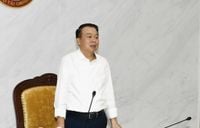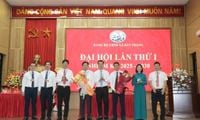On July 26, 2025, a pivotal meeting convened by Vietnam's Ministry of Finance addressed the intricate challenges and ongoing efforts surrounding the implementation of the two-level local government model, which officially took effect on July 1, 2025. This administrative reform, involving the merger and reorganization of communes nationwide, aims to streamline governance, enhance efficiency, and improve public service delivery. However, as the newly merged communes begin their operations, various financial, administrative, and logistical hurdles have emerged, prompting urgent guidance and support from central authorities.
Deputy Director Nguyen Minh Tan of the State Budget Department opened the discussion by highlighting the difficulties localities face in the wake of the mergers. "Since the merged communes became operational, many places have encountered inconsistent infrastructure, management confusion, and delays in salary and operating expense payments," he reported. Such challenges stem from uneven physical facilities and the adjustment pains of new administrative structures grappling with unfamiliar workflows.
To counteract these issues, the Ministry of Finance has proactively issued multiple guiding documents designed to ensure uninterrupted financial and budgetary operations throughout the transition. Maintaining the principle of "no budget disruption" stands at the core of these efforts. Crucially, budget revenue allocation between provincial and communal levels remains stable, preserving the revenue sources and expenditure mechanisms that existed before the mergers. Moreover, the new communes have been entrusted with full budget responsibilities and powers inherited from their predecessor units.
This continuity is underpinned by the Prime Minister’s Decision No. 1390/QD-TTg, issued on June 27, 2025, which provides the essential legal framework for localities to implement continuous budget estimates without interruption. The Ministry has also guided local authorities to review and submit resolutions to their People's Councils to decentralize revenue and expenditure responsibilities clearly and transparently, in accordance with the State Budget Law. This enables the new communal governments to manage their finances autonomously and with accountability.
Further technical guidance has been provided on identifying Level I and Level II budget estimating units, a critical step to avoid overlaps or omissions in budgeting. Level I units include the Commune Party Committee Office, Commune Fatherland Front Committee, and public non-business units under the Commune People's Committee. Specialized departments and the Public Administrative Service Center are to be assigned Level I status based on local conditions and functions, ensuring clarity in budget management.
Looking ahead, the Ministry has instructed localities to prepare the 2026 communal budget estimates and a comprehensive three-year financial plan (2026-2028) following Circular No. 56/2025/TT-BTC. This approach aims to foster systematic, realistic financial planning that supports sustainable commune development.
However, Deputy Director Nguyen Manh Cuong of the State Treasury revealed that many communal budget estimating units have yet to open accounts with the State Treasury, a vital step for transparent and efficient budget execution. Causes include the absence of People's Council resolutions on budget decentralization, incomplete financial accounting systems, unappointed chief accountants and account holders, insufficient signature samples, and high personnel turnover following the mergers. To address this, the State Treasury has urged provincial People's Committees to direct units to comply with Ministry of Finance guidelines and ensure timely account registration and usage.
Moreover, provincial Departments of Finance are tasked with clarifying the number and types of communal budget estimating units. In cases where People's Councils or People's Committees have not finalized budget estimates, the Departments must coordinate with the State Treasury to facilitate temporary budget allocations, particularly for essential expenditures such as salaries, in accordance with the State Budget Law. This measure ensures uninterrupted government operations during the transition.
Another logistical concern involves the allocation of public vehicles to the newly formed communal administrative units. Nguyen Tan Thinh, Director of the Public Asset Management Department, explained that provincial People's Committees determine specific vehicle quotas and can reallocate cars from district levels or acquire new ones if necessary. This ensures that the new communes are adequately equipped to fulfill their duties according to established standards.
Regarding office space, Government Decree No. 155/2025/ND-CP, issued on June 16, 2025, stipulates that any excess headquarters area beyond prescribed standards can be reassigned to other agencies or managed by the receiving unit to ensure efficient use of public assets. This regulation provides flexibility and promotes resource optimization amid the administrative reshuffle.
To facilitate ongoing communication and rapid resolution of emerging issues, the Ministry of Finance has established hotlines and designated contact persons across various fields since July 15, 2025. Deputy Minister Nguyen Duc Chi advocated for the creation of group chats on platforms like Zalo and Viber involving localities and relevant agencies to promptly address and resolve concerns. He also instructed specialized Ministry units to compile frequently asked questions and detailed answers, making them accessible to local governments for reference.
Deputy Minister Chi acknowledged that most difficulties raised by localities fall within their own authorities, such as budget estimates and official seals. Hence, he urged provincial Departments of Finance to provide strong advisory support to local governments on financial, budgetary, and public asset matters to prevent bottlenecks.
Recognizing the challenge many communes face in appointing qualified chief accountants, the Ministry assigned the Department of Accounting Management and Auditing to review the situation and propose solutions, with a report due the following week. Furthermore, the Ministry expressed readiness to provide training and capacity building for financial cadres at all local levels, ensuring they are equipped to meet the demands of the new governance model.
Meanwhile, in Bat Trang Commune, the Party Committee of the People's Committee marked a significant milestone by holding its first Congress for the 2025-2030 term on July 26, 2025. Established on July 1, 2025, the Party Committee comprises 72 members across five subordinate party cells, including offices for the People's Council, Economic Department, Culture and Social Affairs, Cultural and Sports Center, and the Investment Project Management Board.
This Congress symbolizes the collective determination of party members, civil servants, and public employees to overcome the challenges of operating under the new two-level local government model. Despite limited infrastructure and heavy workloads, the Party Committee has focused on fostering unity, innovation, and effective leadership to achieve its goals.
Key targets set for the 2025-2030 term include ensuring that 100% of party cells conduct quarterly thematic meetings, with at least 95% party member attendance at monthly meetings. All party members currently working will be assigned specific duties, and leadership within party cells will receive ongoing training to enhance their skills and knowledge.
Economic and social objectives are ambitious: the commune aims to generate over 150 billion VND in state budget revenue, raise average per capita income to more than 110 million VND per year by 2030, achieve new-style rural commune standards, and maintain the status of having no poor households, striving to eliminate near-poor households entirely.
Leadership appointments from the Congress include Hoang Tien Dung as Secretary of the Party Committee and Duong Dang Hoa as Deputy Secretary. The Congress's resolution was unanimously approved by all attending party members, reflecting strong solidarity and commitment to fulfilling the outlined objectives.
In addition to administrative and financial developments, Bat Trang Commune commemorated the 78th anniversary of War Invalids and Martyrs' Day on July 27, 2025, with leaders visiting and presenting gifts to war invalids, sick soldiers, and families of martyrs. This gesture underscores the commune's dedication to honoring its history and caring for those who have contributed to the nation.
Altogether, these coordinated efforts by the Ministry of Finance and local governments like Bat Trang Commune illustrate a determined push to navigate the complexities of administrative reform. With continued guidance, training, and resource allocation, Vietnam's two-level local government model is poised to enhance governance effectiveness and better serve its citizens in the years ahead.


